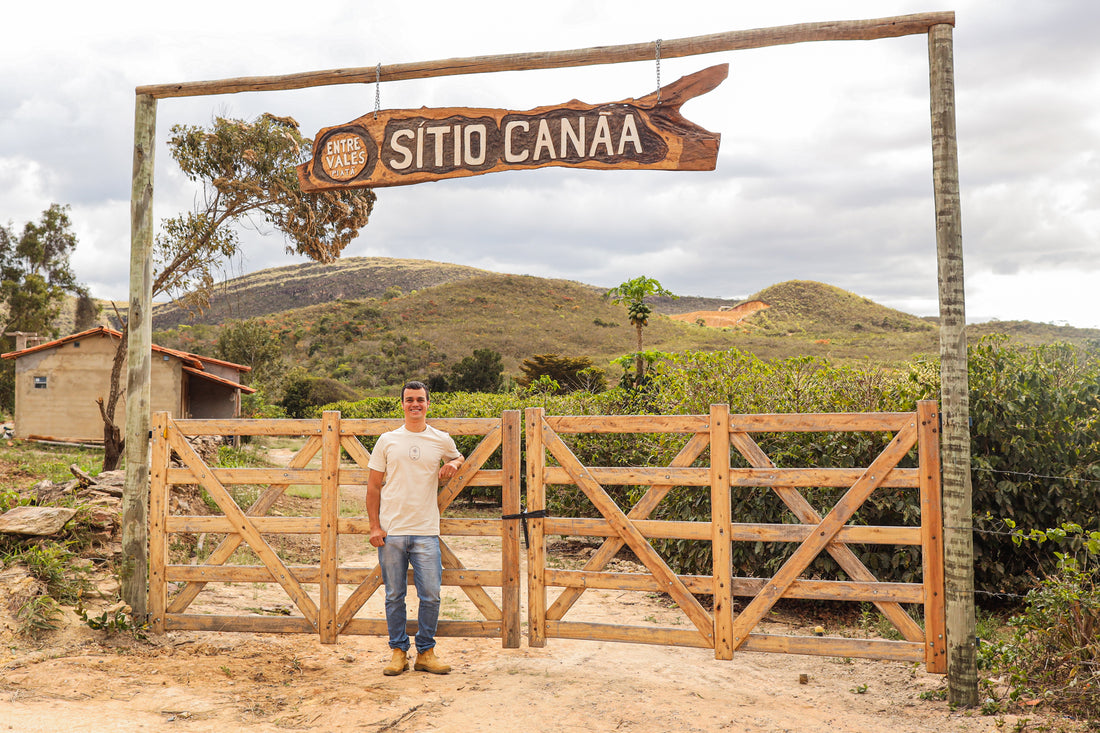==split_content==

==split_content==
Guava, Strawberry, Almond, Floral

This microlot was grown at Sítio Canaã (which translates to “The Promised Land” in Portuguese). The farm lies just outside the small town of Piatã, in Bahia’s Chapada Diamantina region, which ranges across 1,280 to 1,340 meters above sea level. Chapada Diamantina translates to ”Diamond Plateau” in Portuguese, and for 100 years this area was mined for the gemstones embedded in its cliffs. Today, the region is famous for its specialty coffee.
Sítio Canaã is owned and managed by Kleumon Silva Moreira, who began his career by working alongside his mentor, Antônio Rigno. Antônio is widely regarded as the best producer in the region and is famous for his commitment to quality, having achieved many accolades for his coffees in the Cup of Excellence competition and other quality awards over the years.

In 2016, using all of his savings along with a small loan from the bank, Kleumon put together enough to establish his own coffee farm. He purchased a 10-hectare plot of land and began planting it with a wide range of varieties – Topázio, Catuaí, Obata, Acauã, Paraiso, Arara and Bourbon. This lot is 100% Arara.
Kleumon is a conscientious producer and very meticulous in the way that he approaches every aspect of his plantation. Each of the trees at Sítio Canaã is carefully planted 60cm apart and in rows that are 3.3m apart, mirroring the precision and best practices from Antônio Rigno’s farms. To optimise and supplement his income whilst the coffee plantation is fully established, Kleumon has also planted sugarcane, passionfruit, and strawberries, but as his coffee production grows, he is slowly moving away from these crops.

Kleumon represents the next generation of coffee producers in Piatã and continues to impress with his considered and progressive approach to coffee production. Our green beans supplier, Melbourne Coffee Merchants, has purchased his complete harvest every year since 2018, when he first began producing coffee — and hopes to continue to do so for many years to come.
About Piatã
Piatã is a unique and distinct coffee-growing region. The coffees produced here tend to be very floral, sweet and complex, and quite different from those that we source elsewhere in Brazil. There are two main factors behind this: coffee grows at elevations of up to 1,400 meters above sea level, which is very high for Brazil; additionally, temperatures in Piatã range from about 2°C to 18°C in winter, some of the lowest in the country. Combined, the high elevation and cool climate are key in slowing down the maturation of the coffee cherries, leading to an increased concentration of sugars in the bean. The result is a cup profile that is bright, transparent, and distinctive. Further, Piatã’s relative closeness to the Equator line ensures coffee trees can experience such drastic conditions without being affected by frost, unlike other, more traditional coffee-growing regions in the country.

The soil is nutrient-rich and slightly humid, creating a healthy and diverse ecosystem that is home to some 1,600 individual plant species. While the highlands of the Chapada Diamantina are rugged and dry, the area surrounding Piatã is filled with streams, waterfalls and even swamps, providing water for irrigation and agricultural techniques.
How This Coffee Was Processed
Kleumon ensures cherries were picked by hand only when fully ripe. His picking team mainly consisted of his family members, including his mother who lives close by. Once picked, cherries washed gently and left to ferment in a small bioreactor for 72 hours.

The coffee was then laid out to dry on raised African beds for 25 days, inside greenhouses. During drying, the cherries were turned several times a day to ensure they were drying evenly. At this stage, the coffee is primarily left in the shade and greenhouses are closed overnight, as both of these actions slow the drying down and extend it considerably. This is key in improving and ‘saving’ the fructose and all positive attributes found in the fruit that contribute to a higher quality in the final cup. Finally, the beans were separated into numbered lots, and later stored and rested at a purpose-built warehouse at Fazenda Progresso, to be prepared for export.
